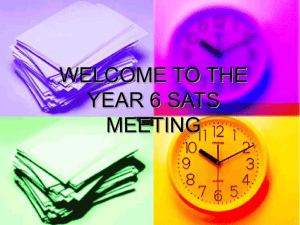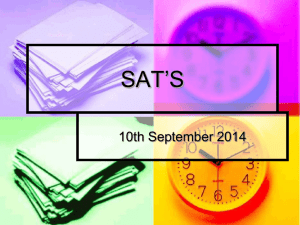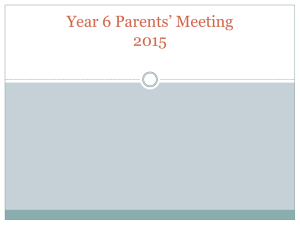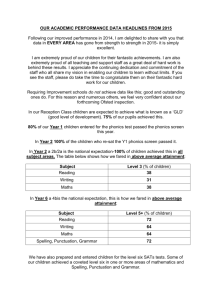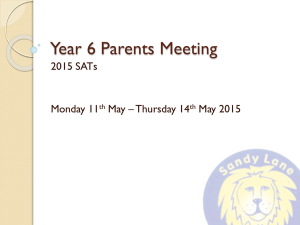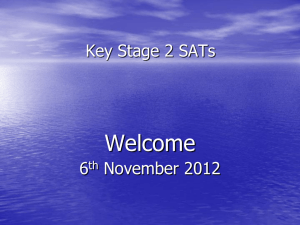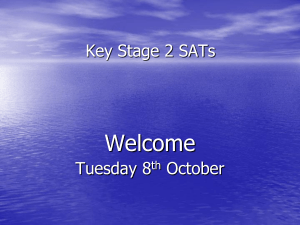KS2 SATs brief hand out
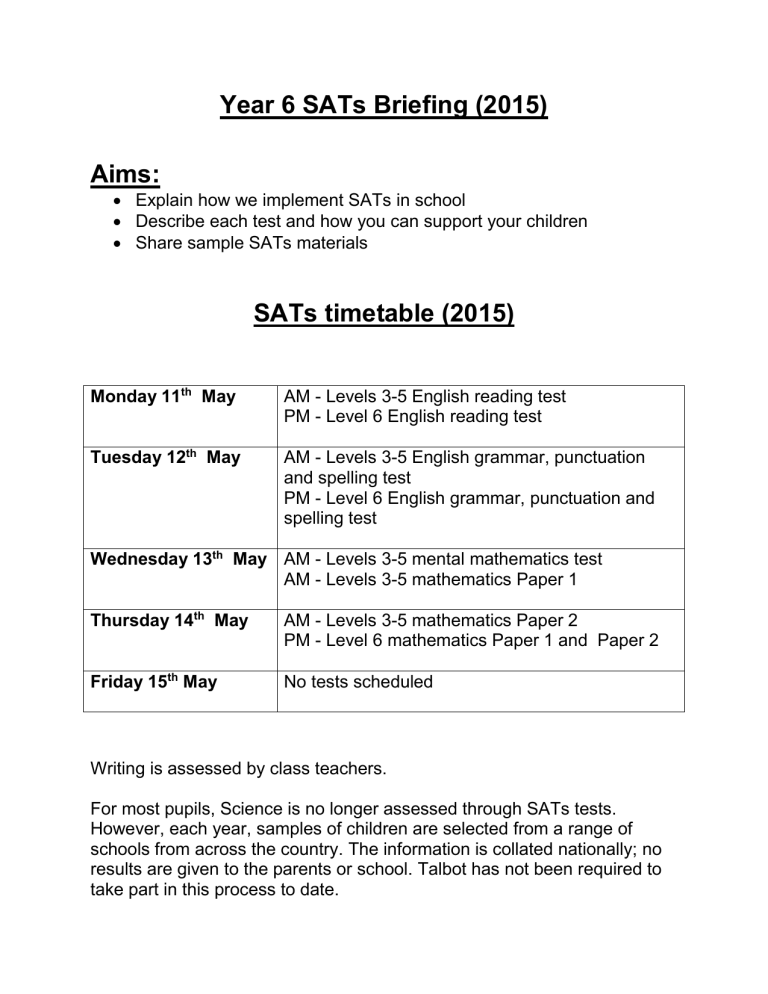
Year 6 SATs Briefing (2015)
Aims:
Explain how we implement SATs in school
Describe each test and how you can support your children
Share sample SATs materials
SATs timetable (2015)
Monday 11
Tuesday 12 th th
May
May
AM - Levels 3-5 English reading test
PM - Level 6 English reading test
AM - Levels 3-5 English grammar, punctuation and spelling test
PM - Level 6 English grammar, punctuation and spelling test
Wednesday 13 th May AM - Levels 3-5 mental mathematics test
AM - Levels 3-5 mathematics Paper 1
Thursday 14 th May AM - Levels 3-5 mathematics Paper 2
PM - Level 6 mathematics Paper 1 and Paper 2
Friday 15 th May No tests scheduled
Writing is assessed by class teachers.
For most pupils, Science is no longer assessed through SATs tests.
However, each year, samples of children are selected from a range of schools from across the country. The information is collated nationally; no results are given to the parents or school. Talbot has not been required to take part in this process to date.
How can you support your child in writing?
Encourage writing at home, especially writing for a purpose.
Discuss ideas for homework with your child, before they settle down to write it independently.
Ask your child to read your homework to you. Can you improve it and make corrections?*
Insist on good handwriting and presentation.
*Not sure what to ask them? Visit the Parent/Carer Zone and go to the
Literacy Zone. There are documents showing how you what your child needs to do to achieve Level 4 and Level 5 in writing, so you can help them.
How can you support your child in reading?
Promote the experience of reading by valuing and modelling it.
Encourage your child to read often and broadly.
Listen to your child read and discuss it with them; this is more important than the mechanical skills.
Ask them questions about their books.*
Get your child to write down their answers, especially if they find this tricky.
You can buy reading comprehension study books (from WH Smiths and the like) and look at the reading texts on Education City. You need to check that anything you buy is designed for KS2 and levels
3-5.
*Not sure what to ask them? Visit the Parent/Carer Zone and go to the
Literacy Zone. There are examples of questions for fiction texts, non-fiction texts and poetry to give you some ideas.
How can you support your child in grammar, punctuation and spelling?
Encourage lots of reading! Why has the author chosen to use punctuation at certain points?
Education City has many resources.
Help your child to learn their spellings each week.
Insist on good grammar in homework. Check it with them. Is it correct? Could it be more ambitious?
How you can help your children prepare for the maths tests:
Make sure that your child always does their maths homework.
Support them with their times table knowledge (including applying it).
Make sure your child can tell the time.
Make sure your child is confident with practical measuring and different units of measurement.
Encourage maths in real life, so it becomes less abstract.
Education City (including timed tests)
You can buy maths study books (from WH Smiths and the like). You need to check that anything you buy is designed for KS2 and levels
3-5.
Applying for additional time:
Schools may apply for additional time online, by answering a short series of questions about the child. The questions will draw on teachers’ knowledge of children and their ability to assess an individual child’s access needs. It is no longer linked to particular screening tests.
Additional time is designed to support children with specific needs, rather than to give an edge for middle ability children. In addition, the time provided must make a significan t difference to a pupil’s performance.
Last year, one pupil was eligible for additional time.
Help with Readers:
Pupils cannot be helped with reading in the reading test.
Pupils can be supported with reading in the maths and SPAG tests.
Support means assisting children who are having mechanical reading issues; they cannot have things explained to them. Typically, children are helped with individual words, phrases or questions, rather than the whole tests.
Level 6 tests:
Nationally, 0% of children achieved Level 6 in reading, 2% achieved
Level 6 in writing, 3% achieved L6 in Grammar, Punctuation and
Spelling and 6% achieved Level 6 in maths. This is equivalent to between 0 and 4 children in our current Y6.
As the Level 6 tests are so challenging, only a small minority of pupils will be selected to sit them by their teachers.
Children must complete the Level 6 tests on top of the normal Level
3-5 tests.

